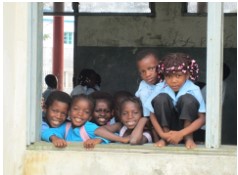Speeches Shim
World Food Program ![]() (pdf - 146k)
(pdf - 146k)
BACKGROUND
Almost one-third of Mozambicans suffer from chronic food insecurity, exacerbated by the historic drought of 2015-2016. Nationally, 43 percent of children under 5 are stunted. Micronutrient deficiencies are widespread: 69 percent of children under 5 are anemic, and 74 percent of children under 5 are vitamin A deficient, with negative impacts on growth, immunity and development.
The National Nutrition Rehabilitation Program (PRN) was established by the Government of the Republic of Mozambique in 2010. The PRN sets clinical protocols for treating acute malnutrition for two distinct groups: 1) patients below 15 years of age 2) patients aged 15 years of age and older (including pregnant and lactating women). Corn-Soy Blend plus (CSB+) is the supplementary food used for treatment of moderate acute malnutrition (MAM) in the areas of Prevention of Mother-to-Child Transmission (PMTCT) of HIV, support of orphans and vulnerable children (OVC), and support to people living with HIV/AIDS.
PROGRAM DESCRIPTION
WFP’s main role is to procure and distribute supplementary food. The CSB+ is provided in a monthly ration of 10 kg of CSB+ per beneficiary, based on nutritional criteria. WFP also builds local capacity to ensure quality and adequate storage of the nutritional commodity. Under the current bilateral agreement, WFP is distributing CSB+ for nearly 46,000 vulnerable beneficiaries on a monthly basis, including beneficiaries in the most drought affected provinces and health facilities.
EXPECTED RESULTS:
- Provision to health facilities of a quantity of individual supplementary food support packages sufficient to support approximately 25,000 malnourished beneficiaries, including HIV+ adults, children under 5, and pregnant and lactating women during the period of nutrition rehabilitation;
- Reduced loss of CSB+; and
- Strengthened capacity of health workers for implementation of nutrition activities.


Comment
Make a general inquiry or suggest an improvement.